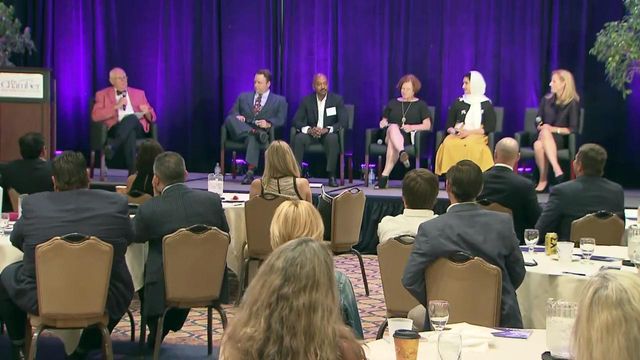Raleigh mayoral candidates seek to define themselves
With Raleigh's mayoral election a little over three months away, the five announced candidates to succeed Mayor Nancy McFarlane are trying to differentiate themselves in the eyes of voters.
Posted — Updated- Former Raleigh City Councilwoman Mary-Ann Baldwin
- Community activist Zainab Baloch
- Attorney Charles Francis, who lost to McFarlane in 2017
- Musician George Knott
- Former Wake County Commissioner Caroline Sullivan
All five took part in a question-and-answer session Tuesday at a Greater Raleigh Chamber of Commerce event in Pinehurst, addressing issues from transit to affordable housing to clean water. Below are snippets of the conversation with moderator Tom Campbell.
Knott: "We're way too big. I wish the city would stop artificially growing."
Baloch: "Growth is important for mobility and economic opportunity, but it depends on what that growth is and who that growth is harming and who it's benefiting."
Francis: "Growth will expand opportunities for everyone. At the same time, our challenges and our problems are problems of growth."
Sullivan: "What we're lacking is the process and the vision of what do we want to be and how do we want to grow. Lately, we've been reactive to growth."
Baldwin: "I don't see the problem being growth. I see the problem being a lack of leadership – people sitting on their hands not doing anything."
Francis: "We probably are going to have to look at going to some of the other reservoirs and bringing essentially a big straw to bring water over to Raleigh."
Baloch: "It needs to be looked at as not just how are we going to have clean water [but] how are we going to have clean water, clean air, how are we going to make sure that we're going to do something about the climate change that's happening."
Sullivan: "It's not just figuring out where's the water source of tomorrow ... but also, do we have plans for conservation?"
Baldwin: "We have to start acting regionally because water is not just a Raleigh issue, it's a regional issue."
Knott: "There's only so many gallons an hour that comes down the Neuse [River], and we can't make it any bigger as a city or a state. It's a Corps of Engineers problem, and I don't know how bad it's going to have to be to pressure them to make our reservoir any bigger."
Sullivan: "Housing is one thing, but there's a lot of human services that goes in this as well."
Baloch: "We really need to call it people-first housing. We need to figure out the needs of different, various groups and figure out what that housing looks like."
Baldwin: "It's about housing choices. There are many different audiences, residents that we have to accommodate."
Francis: "When you have growth like what we have, you're always going to have affordability issues. ... We've just got to start doing something about this problem."
Knott: "Raleigh, for the past 20 years, has taken our affordable housing and it's competed with [private business]. I don't understand why we're tearing down city affordable housing and replacing it with market-rate units.
Baloch: "A priority for me would be southeast Raleigh, would be really figuring out how we invest in this area that we've really ignored for a long time."
Baldwin: "When we keep building in downtown, that keeps our taxes low."
Francis: "My emphasis is going to be including more people in Raleigh's growth."
Knott: "Economically, the bottom, wherever there's a need."
Sullivan: "You have to focus on the city as a whole."
Knott: "We have overbuilt for what we have the bones for."
Francis: "We need to make [public transit] more convenient so that people who have a car and have an option will choose to get out of the car."
Baldwin: "Commuter rail is my No. 1 priority."
Baloch: "We're not walkable. It comes with creating grocery stores, creating places that people can walk to."
Sullivan: "We're a region, not just a city."
Baldwin: "It's about people getting to know people and people not fearing people, so I'm a big proponent of community policing."
Francis: "People have got to get to know one another in a way that's sustainable and real and that they're going to stick with."
Baloch: "Hold ourselves accountable and by that hold our organizations accountable for making sure that we're meeting the needs of all our residents."
Sullivan: "How do we start having these hard conversations in elementary school and continue them as we grow up?"
Knott: "You're asking the wrong guy. This is so far out of my wheelhouse."
Baloch: "We need to talk about the people."
Knott: "Come and look at it. Let it sell itself."
Baldwin: "One of the greatest selling points of our city is that people here are nice."
Sullivan: "We have more things going for us in this area than any other place in the country."
Francis: "Those of us who are doing well can do much better if we include more people. We're leaving too many people out. We need to sell that brand to people and let people in California and all over the world that we're going to include more people."
Related Topics
• Credits
Copyright 2024 by Capitol Broadcasting Company. All rights reserved. This material may not be published, broadcast, rewritten or redistributed.






